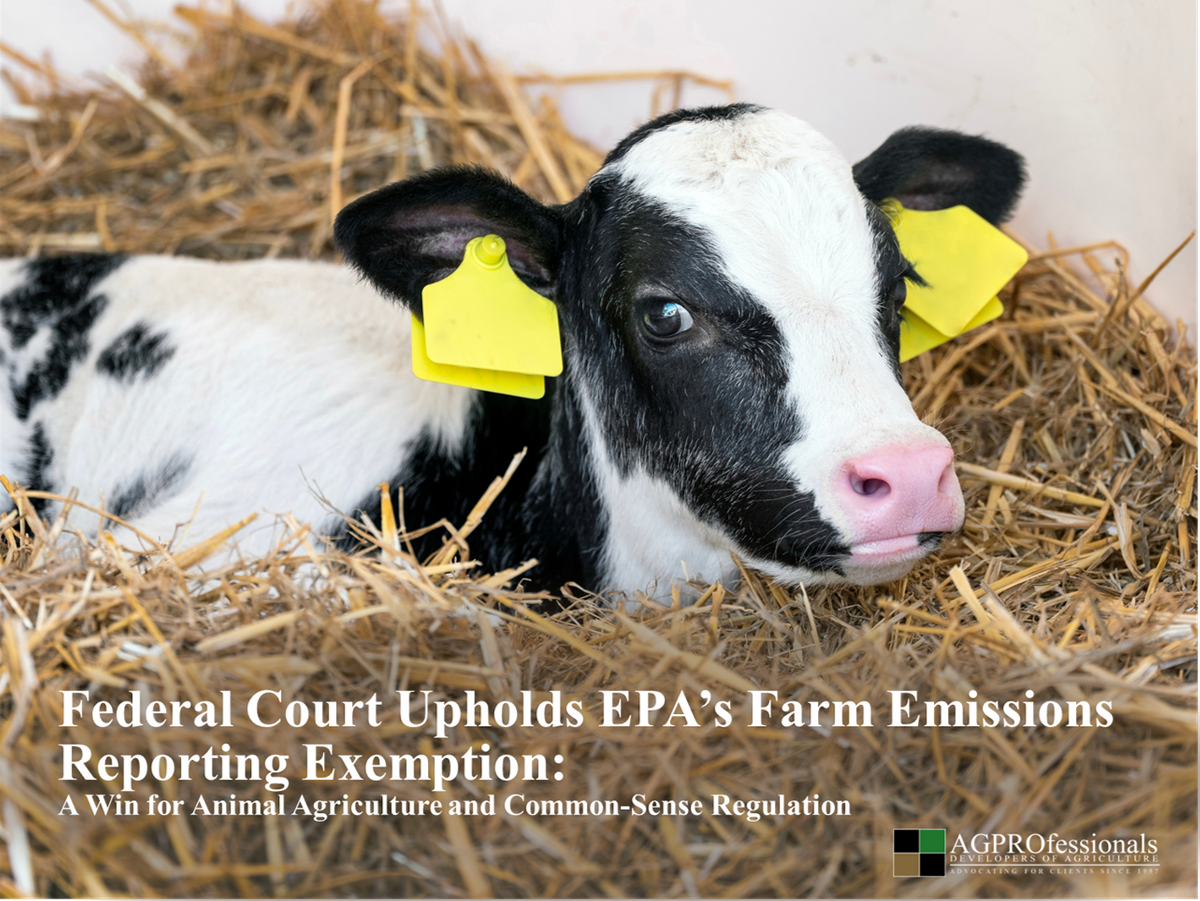Federal Court Upholds EPA’s Farm Emissions Reporting Exemption: A Win for Animal Agriculture and Common-Sense Regulation
Landmark Decision Protects Farmers from Burdensome Federal Paperwork
August 7, 2025, the U.S. District Court for the District of Columbia upheld a critical Environmental Protection Agency (EPA) exemption that protects farmers and ranchers from having to report routine air emissions from the natural breakdown of animal waste. This ruling affirms the EPA’s 2019 final rule under the Emergency Planning and Community Right-to-Know Act (EPCRA), which clarified that such reporting is not required when emissions are already exempt under the Comprehensive Environmental Response, Compensation, and Liability Act (CERCLA), the federal Superfund law.
This exemption has far-reaching implications for livestock producers across the United States, safeguarding agricultural operations from unnecessary regulatory burdens that were never intended for natural, biological processes.
The Legal Journey: Two Decades in the Making
The court’s decision stems from a long-running legal debate over whether farms should be required to report emissions like ammonia, which occur naturally as manure decomposes.
- Early Legal Battles: In the late 1990s, environmental groups challenged EPA’s exemptions, arguing that both CERCLA and EPCRA should require such reporting.
- Industry Pushback: Poultry, cattle, and pork industry groups, including the National Cattlemen’s Beef Association (NCBA), U.S. Poultry & Egg Association (USPOULTRY), National Pork Producers Council (NPPC), and the American Farm Bureau Federation (ABFB) countered that these laws were designed for hazardous chemical accidents, not normal farm operations.
- Congress Steps In: The 2018 Farm Bill, also known as the FARM Act, explicitly exempted farms from CERCLA reporting for emissions from animal waste.
- EPA’s 2019 Final Rule: The EPA extended this exemption to EPCRA, aligning the two statutes. Environmental and animal rights extremist groups, including the Humane Society of the United States and Food and Water Watch, sued to overturn the rule.
- Court’s Final Word: On August 7, 2025, the court sided with EPA and agricultural intervenors, ending more than 20 years of legal uncertainty.
Why This Matters for Animal Agriculture
This decision is about more than paperwork; it protects farmers and ranchers from unnecessary federal interference. The court acknowledged that emissions from decomposing manure are a natural part of livestock farming and do not constitute an emergency that CERCLA and EPCRA are meant to address. Requiring farmers to submit such reports would impose a significant compliance burden without providing environmental or public safety benefits. Notably, that is precisely why the Humane Society of the United States, now called A Humane World for Animals, sued to overturn the rule. Their aim is to end animal agriculture, and one of their strategies is to impose burdensome and egregious regulations on farmers and ranchers.
US POULTRY President Nath Morris applauded the ruling, calling it a “common-sense” resolution that removes a purely administrative exercise from the lives of farmers and ranchers. NCBA’s Kaitlynn Glover added that “family cattle producers should not have to file reports for a natural, biological process under a law meant for significant chemical contaminants.”
A Victory Against Regulatory Overreach
From a property rights standpoint, the ruling reinforces the principle that federal agencies must respect the intended scope of the laws they enforce. Both CERCLA and EPCRA were designed to respond to industrial chemical spills, not to regulate the everyday biological processes that occur on farms.
By affirming this exemption, the court has:
- Preserved Congressional intent as expressed in the 2018 FARM Act.
- Protected producers from costly and time-consuming reporting requirements.
- Strengthened the legal foundation for future challenges to regulatory overreach affecting agricultural operations.
What’s Next for Producers
While the legal battle over this specific issue is resolved, the broader fight against excessive regulatory burdens on agriculture continues. Animal agriculture advocates must remain engaged in policy discussions to ensure that future regulations are based on science, practicality, and respect for private property rights.
AGPROfessionals will continue to monitor legal and regulatory developments affecting the livestock industry, ensuring our clients remain informed and prepared.
Links
EPA's CERCLA and EPCRA Reporting Requirements HERE
Article in Meat and Poultry HERE
Article in Morning Ag Clips HERE
Article in MeatingPlace HERE

